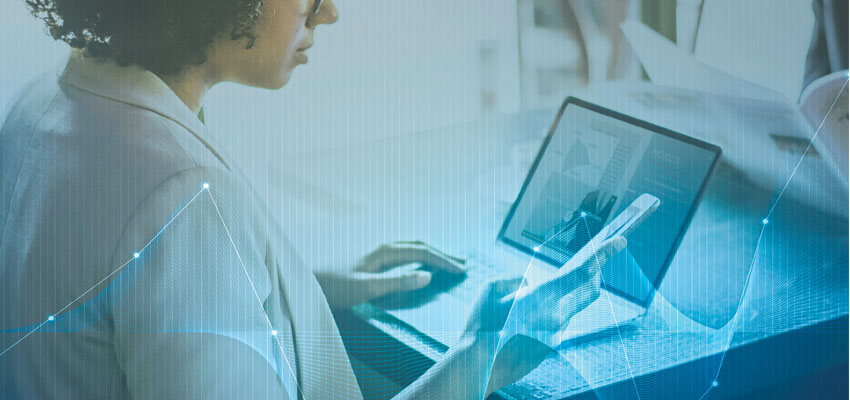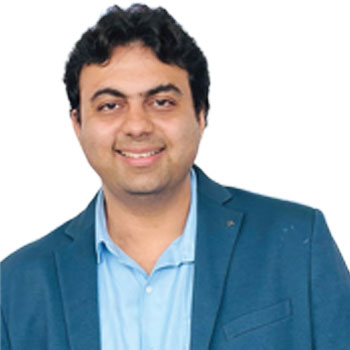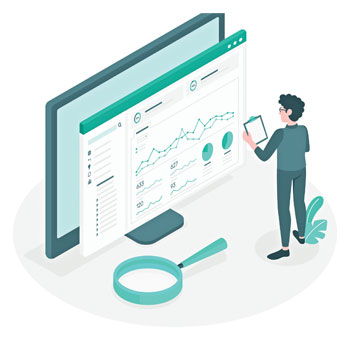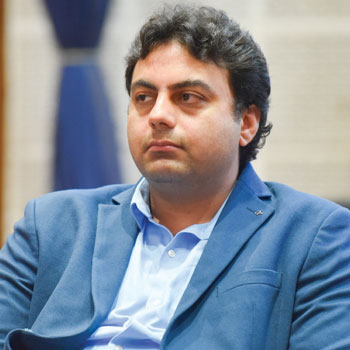Transforming business With Analytics

With artificial intelligence (AI) becoming a trend these days, Shiv Malhotra, Executive Director at Wells Fargo and an industrial engineering professional, illuminates on how data analysis is changing the way of achieving business success. In conversation with Corporate Citizen, he discusses the changing world of analytics, the necessity for cybersecurity, and the impact of AI in generating new employment opportunities and more. Read on…
Corporate Citizen: Let us begin with your career journey. How did analytics become your calling?
Shiv Malhotra: Computer science has always been my calling. It came as a choice because the whole infrastructure of where I used to work is now moving towards data. For example, I worked at JP Morgan Chase and Co., it had a lot of legacy technology back in 2008-2010. But then, suddenly the international banks realised that they are not monetising their data. So, they started projects and they brought in a lot of consultants, initially to mine the data. So, that's where I think we got involved, and then a lot of projects came our way as managers of these banking processes. So, there was no choice but to learn. Eventually, today analytics has become a core in everything we do, because without data you are nobody.

At each point, when you have to make a decision, you need to make informed decisions. Management is nothing but only about how informed your decision-making is—the data. You have to mine the data, which then becomes information, and then it becomes knowledge. So for us, it came because of the necessity to move our infrastructure and use the data to monetise whatever we have. For instance, if I have been working with a client for 10 years, I may know their transaction history, but I would not know about their potential. Now to understand the potential, I have to dig deeper into their transactions. I need to know what transactions they are making, how they are making them, the patterns, and the behaviour of the transactions. And, that's where the data analytics comes in. So, analytics starts with very descriptive statistics and moves to prescriptive, where the data is mined and reviewed. Then, the data itself gives you a decision on what needs to be done. Thus, I started with small projects, but eventually it got very complex. Now, we use Python and other libraries to handle these complex analytics solutions, and it gives incredible results.
"I believe that with AI, many new opportunities are opening because you need a gamut of infrastructure to support these new products. It will create more jobs in the economy that were never existing before"
-Shiv Malhotra
CC: In the present climate, data analytics and data science have become buzzwords, and everyone regardless of their educational background is pursuing these courses. How do you see these domains?
Data was there since time immemorial. It is a piece of information taken out from crude data, by arranging it in a certain structure. These domains are not new, they existed years back but in the form of statistics. However, today the computer science has the power to compute that data at a speed that was not possible earlier. So, it's not that today it's a buzzword, it was a buzzword every day because we take decisions only based on data. For example, you go to a certain shop to buy something, so you compare things and then based on certain data or information, like maybe a price or packaging, you may buy or may not buy that thing. Today, you can process a lot of data in bulk and get insights that were not very clear to the naked eye earlier, because computers are able to process a lot of data. As of today the tools have become more sophisticated.
CC: How do you see it growing in the coming years?
Moore's law states that your computing capacity is increasing every day and the cost is decreasing every day. Hence, this will accelerate, because your memory will become cheap, and your computing powers will become cheap. Today, Nvidia has become a two trillion-dollar company. How? Because they are creating astronomically fast chips that make calculations in petabyte per second. The kind of information getting processed today in fractions of seconds, that is the value it will generate. So in the coming days, these chips will become more sophisticated. The computing power will increase, and the memory will become cheap.
For example, Facebook has around billion users. How are they able to maintain a billion users' data? Because the memory is cheap, and that's how they could store the data of billions of people in a server.
CC: Data analytics is all about collecting, filtering and using it for different purposes. So in this process, how does cybersecurity help to ensure that the data remains in safe hands?
In my view, cybersecurity is, the more you grow the more vulnerabilities you create in the system, and ultimately it's a piece of code. I believe that whoever is creating the code, can also break it. So, the vulnerability is definitely there. The only thing we can do from our side is have some practices that are very commonsensical.

For example, creating long and complex passwords can work. In my bank, it is mandatory to have a password not less than 16 digits, and it has to meet six or seven conditions. You have to make it more complex, to make it immpossible for someone who wants to break into that system. In this way, you can actually put controls because you cannot avoid the situation. So, what my idea about cybersecurity is that your device controls to navigate the complexity, so that somebody else cannot break the house, like putting a lock on your house. Now what are the measures you can take so that the lock cannot be broken? That's what cybersecurity is, in very layman's terms.
So my only take on this is that there are certain common-sensical things, which if you can avoid, can actually result in fewer incidents. There are a lot of banks that have lost billions of dollars to hackers because hackers look only for information that is stored in the cache somewhere in the browser.
CC: As data gets stored in cache files, many companies tend to sell this data. This can lead to various internet frauds happening worldwide. So, what preventive measures can be taken to address this issue?
A lot of frauds are happening because of patterns. For instance, when you click 'I agree' for 'Terms of Use' user agreement on Facebook, you are actually giving them consent. You may not believe it, but none of us reads the 'User Agreement' terms and conditions. Because, when we agree to that privacy policy, we give our consent that the personal data can be sold to a third party. And, why they are taking that consent is because they are providing their space for free to you. Today, Gmail is giving 15 GB of space to every individual. They have a billion accounts on Gmail. Everybody of us has an account on Gmail. How are they able to provide it? Because they take a consent that whatever information, communication, and correspondence you have with us will be sold to a third party. And that's what they are providing free service for.
So. now what can be done to prevent this? First, don't write passwords anywhere and keep your cache clean. Because, a lot of this activity of hacking happens due to the cache files. So, clear your cache regularly or maybe have an option that when you exit your browser, the cache file gets cleaned automatically, especially when you are working on something critical. So, you have to find where the leakages are and how to plug those leakages. That's the only thing we can do.
"Sometimes, with a fixed mindset you can spend your whole life doing the same thing in your profession. However, today is not that era. Here, if you don't unlearn and learn things very frequently, then you are out of the game"
CC: In your personal and professional life, how do you see setbacks and learn to overcome them?
I am an avid reader, which for me is the key to handling setbacks. I would say that reading good material really pumps you up and provides good energy to operate in the right direction.
In addition to this, I would want to share some scenarios. After working for 10 years in the back office banking business, when I moved to an FMCG company, I thought that it would be an easy transition. I was appointed as the head of treasury in that company.
So, for the first six months, honestly, I had no clue what I was doing. I was managing billions of dollars with a team of 50 people under me. But, it was not easy to understand the business because the context was different. The way they operate, their culture, everything was different. So, I thought I would be able to assimilate because I have 10 years of work experience. However, it was not easy. After completing my first year term, I was actually given the feedback that if this continues, then you may have to leave the job—that was the situation, and now I had to bounce back. I took help from my seniors, understood what is happening, what is the context, where I am going wrong, and how I can really make an impact—you need to self-reflect and understand the context.
Also, there are two approaches to this experience—fixed mindset and growth mindset. If I had not adjusted according to the culture of the company, I could say that sorry things are not working; let me move to another company—this is called a fixed mindset. But, another approach could be to take it as a challenge. Accept the situation and think of what you can do from here, to make things work for you—this is called a growth mindset.
There is a very good book called Growth Mindset, which I recommend reading. When we say growth mindset, you have to be continuously learning. Like, being appointed as the head of treasury because of my past experience and my credentials, it was a new thing for me—I was given a new challenge. Thus, give your best and fight with the situation, and then even if you do not succeed, that's fine, but you must have that growth mindset.
CC: With the advent of AI and Machine Learning, what new job opportunities will emerge in the future?
First of all, let me be clear that it's a myth that the jobs will reduce. If I implement one AI solution, it would require a lot of people in my team. First, a business analyst who will write the requirements of the solution; second, the data analyst who will manage the data; third person for managing, streamlining, and cleaning the data; and one more for coding. Then, when the solution is built, someone will have to package it as a product. After, the product is built, I would need someone to maintain it.

I believe that with AI many new opportunities are opening, because you need a gamut of infrastructure to support these new products. It will create more jobs in the economy that were never existing before. For that to happen, you need three things — simple, better, faster—the keywords that we use in management.
What is simple today? You have an app, you order something, and the product comes to your home. Earlier, the e-commerce deliveries that used to take a day or two are now done in 10 minutes. Obviously, the game has become faster and better. Better because today with the scale that those companies can achieve, they can provide you a better service.
So, I would say that the jobs are not reducing. In fact, the ecosystem has to be created in such a way that you are generating more jobs because you have a new category of demand coming in with these products.
CC: What's the best advice you have got that has changed you in person?
The best form of advice is to be curious. Sometimes, with a fixed mindset you can spend your whole life doing the same thing in your profession. However, today is not that era. Here, if you don't unlearn and learn things very frequently, then you are out of the game.
I am telling you my example—today after spending 15 years in corporate, I am doing a PhD from IIM Sambalpur, because I thought that maybe my edge is reducing and I must do something so I can come back. However, at this age there's no need for me to do that, because I have a good job, I'm working well, I have good relationships at my workplace, and everything is going fine. But, I know that if I don't do this, perhaps in five years I may be redundant. So unless and until you learn something new, improve your skills day by day, it will be very challenging. It was always challenging, but it will be more challenging because there are new skills that you need to learn, and you cannot say no to learning technology. It's a part and parcel of my work. So you have to be curious.
When I say curious, you have to have a growth mindset. You have to learn every time, and you can learn from anywhere, any place, but you need to make sure that you have a plan. So my submission here is that you need to continuously pivot yourself into something that you feel you want to.
"Give your best and fight with the situation, and then even if you do not succeed, that's fine, but you must have that growth mindset"
CC: What is your mantra for work-life balance?
I don't believe in work-life balance, honestly. All these are buzzwords in my view. A lot of times, I feed my daughter while I am taking a call. And, a lot of times I am actually cooking when I am taking a call—so you have to integrate.
For example, if I can demand eight-minute service at my doorstep for a 100-rupee item, then I should also be ready to provide that kind of service to somebody else if they are paying me. It is the same for the corporates—they need everything in minutes; nobody is willing to wait even for an hour. If my boss asked me for a report, they will not wait for an hour. They will say do it in 15 minutes, and it has to be delivered in my mailbox. So then there is no work-life balance. Here what I meant to say is that you need to have that service mindset for you to sustain.
CC: How can we develop a service mindset because many people do not work post their duty hours?
You have to be persistent. If Amazon had not come up with a new business model, then they would never have existed. If they did not have a customer obsession, then they would never exist. So you have to define your USP on what you can deliver, what you cannot, and you need to have those priorities. You need to set the top three priorities in life that you really want to drive. For me, it's my family, my job and my health. So, if I can drive these three things, I know other things will fall in place.